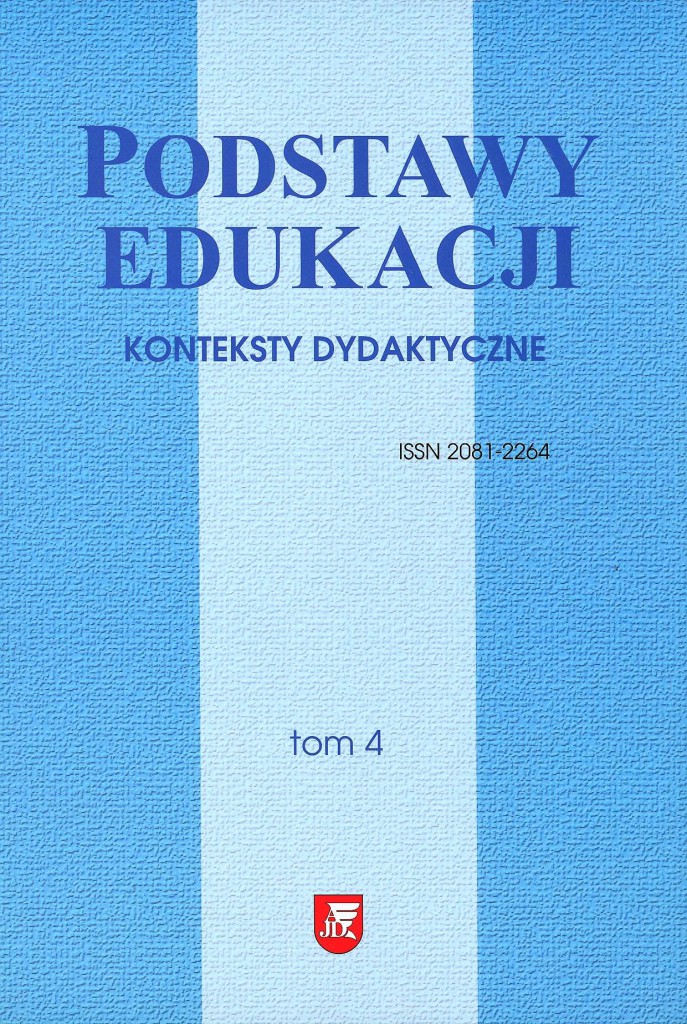Abstract
The essence of the article is to fully determine subjectivity in an autopoietic system, which a school might be. To begin with, we shall try to verify the meaning of a subject and subjectivity. When searching for their source references, we will refer to Aristotles and R. Descartes; thoughts, which will later be criticized as unfulfilled expectations of the modern and contemporary civilization. However, citing M. Heidegger’s opinions on the topic leads to a conclusion that the subject may be treated totally differently to the way described in professional literature. Bringing, therefore, a different depiction of the subject closer, we will try to demonstrate that it emerges where its connection meets with personality, which suggests that educating and shaping should be considered the most important branch of human knowledge. The completion of this thesis will, then, require an explanation of such notions as personality and educational practice. And since the latter is so important both for shaping personality and the emergence of the subject, we shall emphasise the institutionalized form of educational practice, i.e. class-lesson teaching, treated as an autopoietic system. Explaining the meaning of this system shall constitute the next phase of the considerations, whose aim will be to defend the belief that what will be brought in the classrooms in the form of resources and rules at the beginning of each school year will translate into shaping and educating personality and, at the same time, into the possibilities to self-experience by the subjectivity. As this view may evoke some reservations, we will refer to certain considerations about the existence of the so-called reconstructing subject, i.e. one being part of the sense of, for example, film screening, a theatre performance, a book. The article will end in some conclusions.
References
Arystoteles. (2001). Polityka. L. Piotrowicz (tłum.). W: Arystoteles. Dzieła wszystkie. T. 6. Warszawa.
Barker, Ch. (2005). Studia kulturowe. Teoria i praktyka. A. Sadza (tłum.). Kraków.
Bezwińska-Hejnicka, T. (2008). Pedagogika ogólna. Warszawa.
Chauviré, C., Fontaine, O. (2003). Le vocabulaire de Bourdieu. Paryż.
Dembiński, M. (2010). Pedagogika jako podstawa bycia człowiekiem i europejskiej cywilizacji. Studia z Teorii Wychowania, 1.
Descartes, R. (1958). Medytacje o pierwszej filozofii. M. i K. Ajdukiewiczowie (tłum.). Warszawa.
Doroszewski, W. (red.) (1968). Słownik języka polskiego. T. 2. Warszawa.
Feyerabend, P.K. (1996). Przeciw metodzie. S. Wiertlewski (tłum.). Wrocław.
Fleischer, M. (2004). Pies i człowiek. O komunikacji międzygatunkowej. Wrocław.
Fleischer, M. (2005). Nie-dualistyczny konstruktywizm Siegfrieda S. Schmidta. W: M. Fleischer. Obserwator trzeciego stopnia. O rozsądnym konstruktywizmie. Wrocław.
Fleischer, M. (2007). Ogólna teoria komunikacji. Wrocław.
Gałażewski, M. (2009). Teoria systemów autopojetycznych Niklasa Luhmanna – między metafizyką a metabiologią. Przegląd Pedagogiczny, 1.
Giddens, A. (2010). Nowoczesność i tożsamość. „Ja” i społeczeństwo w epoce późnej nowoczesności. A. Szulżycka (tłum.). Warszawa.
Glasersfeld, E. von (1987). Poznanie jako samoregulacja. Etapy konstrukcji „innych” i rzeczywistości”. W: W. Gasparski, D. Miller (red.). Projektowanie i systemy. T. 9. Wrocław.
Górniewicz, J. (1997). Kategorie pedagogiczne. Olsztyn.
Heidegger, M. (1994). Bycie i czas. B. Baran (tłum.). Warszawa.
Heidegger, M. (1999). Ku rzeczy myślenia. K. Michalski, J. Mizera, C. Wodziński (tłum.). Warszawa.
Helman, A. (1991). Suture. W: A. Helman. Słownik pojęć fi lmowych. T. 2. Wrocław.
Hobbes, T. (2005). Lewiatan. C. Znamierowski (tłum.). Warszawa.
Husserl, E. (1982). Medytacje kartezjańskie. A. Wajs (tłum.). Warszawa.
Jurewicz, O., Winniczuk, L. (1970). Starożytni Grecy i Rzymianie w życiu prywatnym i państwowym. Warszawa.
Kmita, J., Banaszak, G. (1994). Społeczno-regulacyjna koncepcja kultury. Warszawa.
Kwieciński, Z. (1993). Mimikra czy sternik? Dramat pedagogiki w sytuacji przesilenia formacyjnego. W: Z. Kwieciński, L. Witkowski (red.). Spory o edukację. Dylematy i kontrowersje we współczesnych pedagogiach. Toruń.
Luhmann, N. (2008). Systemy społeczne. Zarys ogólny teorii. M. Kaczmarczyk (tłum.). Kraków.
Maturana, H.R., Varela, F.J. (1980). Autopoiesis and Cognition: The Realization of the Living. W: R.S. Cohen, M.W. Wartowsky (red.). Boston Studies in the Philosophie and Science, 42.
Męczkowska, A. (2006). Podmiot i pedagogika. Od oświeceniowej utopii ku pokrytycznej dekonstrukcji. Wrocław.
Miller, J.A. (1966). La Suture. Éléments de la logique du signifi cant. Cahiers pour l’analyse, 1.
Mitterer, J. (1996). Tamta strona fi lozofi i. Przeciwko dualistycznej zasadzie poznania. M. Łukasiewicz (tłum.). Warszawa.
Okoń, W. (1972). System dydaktyczny. Warszawa.
Platon. (1958). Państwo z dodaniem siedmiu ksiąg Praw. W. Witwicki (tłum.). Warszawa.
Popper, K.R. (1998). Wiedza a zagadnienie ciała i umysłu. T. Baszniak (tłum.). Warszawa.
Renaut, A. (2001). Era jednostki. Przyczynek do historii podmiotowości. D. Leszczyński (tłum.). Wrocław.
Rubacha, K. (2004). O tworzeniu teorii pedagogicznych. W: Z. Kwieciński, B. Śliwerski (red.). Pedagogika. Podręcznik akademicki, Warszawa.
Seręga, Z. (1989). Socjologiczna koncepcja podmiotowości – zarys problemów badawczych. W: P. Buczkowski, R. Cichocki (red.). Podmiotowość: możliwość, rzeczywistość, konieczność. Poznań.
Szemplińska-Stupnicka, W. (2002). Chaos, bifurkacje i fraktale wokół nas. Warszawa.
Sztompka, P. (1989). Socjologiczna teoria podmiotowości. W: P. Buczkowski, R. Cichocki (red.). Podmiotowość: możliwość, rzeczywistość, konieczność. Poznań.
Taylor, Ch. (2001). Źródła podmiotowości. Narodziny tożsamości nowoczesnej. M. Gruszczyński i in. (tłum.). Warszawa.
Tomasz z Akwinu, św. (2009). Byt i istota. W. Sieńko (tłum.). Kęty.
Wiloch, T. (1993). Szkoła. W: W. Pomykało (red.). Encyklopedia pedagogiki. Warszawa.
Zaorski-Sikora Ł. (2007). Podmiot w świecie ponowoczesnym. W: E. Pietrzak, A. Warchał, Ł. Zaorski-Sikora (red.). Podmiot, osoba, tożsamość. Łódź.
Ziółkowski, M. (2002). System. W: Encyklopedia socjologii. T. 4. Warszawa.
I am aware that the journal is published under the Creative Commons Attribution License (https://creativecommons.org/licenses/by/4.0/legalcode).
By submitting an article, I agree to make it available under this license.
